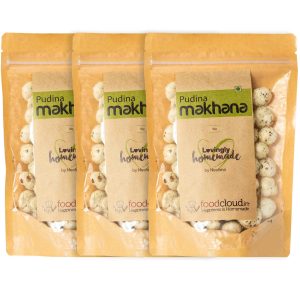Makhana, also known as fox nuts or lotus seeds, has always been in the diet list of health enthusiasts. Pair it with milk, and you have a potent combination that offers a multitude of health benefits. From aiding makhana and milk for weight gain and makhana and milk for muscle growth to promoting makhana and milk for skin glow and makhana and milk for hair growth and hair health, this dynamic duo offers a myriad of benefits. In this blog, we’ll learn about the benefits of makhana with milk, explore their potential to enhance heart health, and even discuss their suitability for babies. If you’re seeking to shed some extra kilos or pack on muscle, this natural combo has something for everyone. Be with us and scroll down to know more!
Benefits of Makhana with Milk
Makhana, derived from the seeds of the lotus plant, is a versatile and nutrient rich food. It’s rich in essential vitamins, minerals, and antioxidants. Combining makhana with milk enhances its nutritional profile and unlocks a range of health benefits.
Let’s dive deeper into the extensive benefits of makhana with milk, particularly in the context of weight management, and overall health.
A Weight Gain Friend
Makhana with milk can be a game-changer for both those who want to lose weight or gain weight. Makhana with milk is a nutritious combination that can support weight gain, muscle growth, and overall health. You can consume makhana with milk for weight gain and makhana with milk for weight loss. While it may not directly impact height, it provides essential nutrients. Makhana and milk can promote heart health, be introduced to babies’ diets, and even support those with diabetes. They are easy to digest and beneficial for strong bones, making this pairing a well-rounded choice for various health goals.
-
 Peri- Peri Flavoured Makhana (Single Pack)₹8440% OFF Shop Now
Peri- Peri Flavoured Makhana (Single Pack)₹8440% OFF Shop Now -
 Plain Makhana (Single Pack)₹7840% OFF Shop Now
Plain Makhana (Single Pack)₹7840% OFF Shop Now
Helps to Lose Weight
Weight loss is a common goal, and Makhana with milk for weight loss can support your journey. Makhana, or fox nuts or lotus seeds, is a low-calorie, nutritious snack that can aid weight loss. It’s rich in fiber, keeping you full longer and reducing overall calorie intake. Milk, on the other hand, provides essential proteins and calcium, promoting muscle growth and fat burning. Combining the two in a snack can provide a balanced, weight loss-friendly option.
Also Read:- Makhana Benefits for Skin
Helps in Muscle Building
Combining Makhana with milk for bodybuilding offers various health benefits, including supporting muscle gain and weight management due to their protein and calorie content which results in muscle growth, and contributing to overall nutrition. Creating a milkshake with these ingredients is a delicious way to consume them, while their heart-healthy nutrients can be beneficial for cardiovascular health.
A Skin Caring Agent
Radiant and glowing skin is a dream for many including male or female. Milk, when combined with Makhana, acts as a natural skin tonic and can be beneficial for the skin when combined with milk. Makhana is rich in antioxidants, which can help to combat skin aging and skin damage. Milk contains lactic acid, which can exfoliate and moisturize the skin. When we use makhana and milk for skin glow in a face mask or scrub, they can promote smoother, hydrated, and radiant skin and eventually result in glowing skin.
Makhana for Hair Care
You can consume makhana and milk for hair growth and that can help you positively in your fight against hair fall. Makhana and milk can be beneficial for hair growth and glowing hair. Makhana is rich in protein and essential nutrients that promote hair health. Milk contains biotin and other nutrients that strengthen hair. When combined together, they can help nourish hair follicles, reduce hair fall, and enhance hair’s natural shine, making it a great choice for those seeking healthier and more radiant hair.
Keeps The Heart Healthy
A healthy heart is the foundation of well-being. Makhana and milk for heart health offers benefits due to their nutrient content. Makhana is low in sodium and high in magnesium and potassium, which help regulate blood pressure. Milk is a good source of calcium and vitamin D, promoting strong bones and overall cardiovascular health. Together, they provide a heart-healthy snack option that can contribute to better blood pressure control and reduced risk of heart disease when part of a balanced diet.
Also Read:- Best Makhana Brands
Makhana is Beneficial for Babies Too!
Makhana with milk for babies can be a nutritious combination. Makhana, being easy to digest, can serve as a healthy snack. Milk provides essential nutrients for a baby’s growth and development, such as calcium and protein. Together, they can be a wholesome addition to a baby’s diet, but it’s essential to introduce them at the right age and in an appropriate form, as per pediatric recommendations.
Helps against Diabetics
Managing diabetes is essential. Makhana with milk can be a suitable choice for individuals with diabetes. Makhana is low in glycemic index count, meaning it has a slow impact on blood sugar levels. Milk provides essential nutrients like calcium and protein. When consumed in moderation, this combo can be a part of a balanced diet for those with diabetes, but it’s crucial to monitor blood sugar levels and consult with a health expert for personalized dietary advice.
Makhana makes the Bones Stronger
Strong bones crucial for overall health. Makhana and milk can contribute to strong bones and better health. Makhana is a source of calcium, and milk is rich in both calcium and vitamin D. When combined together, they provide essential nutrients for bone health. Consuming this combination as part of a balanced diet can support the development and maintenance of strong and healthy bones.
Helps in Proper Digestion
Digestive issues can be bothersome. Now, it is an everyday problem for many. Makhana and milk for digestion can boost digestion in a miraculous way. Makhana is a low-fat and easy-to-digest snack, when milk contains probiotics and is gentle on the stomach. Together, they can help promote a healthy digestive system, making this combination suitable for those looking to maintain or improve their digestion.
Ways to Consume Makhana with Milk
Incorporating Makhana and milk into your daily diet is easy. Here are some practical tips and creative ideas for consumption. To eat Makhana with milk, follow these simple steps:
- Take a handful of Makhana, which are also known as fox nuts or lotus seeds.
- In a pan, roast the Makhana with a little ghee or butter until they become crispy. This makes them tastier and easier to digest.
- Heat a cup of milk in a separate pot. You can use regular milk or any milk substitute you like, such as almond or soy milk.
- When the milk is warm but not boiling, pour it into a glass or a bowl.
- Add the roasted Makhana into the warm milk.
- You can sweeten it by adding sugar or honey if you like. Stir it well.
- Enjoy your Makhana with milk as a nutritious and tasty snack or breakfast. It’s a food that gives your health energy.
Also Read:- Makhana Benefits, Nutritional Facts
Conclusion
Makhana with milk is a dynamic combination that offers a wide range of health benefits. From supporting weight management to enhancing the health of your hair and skin, this duo has a lot to offer. By incorporating it into your daily diet, you can enjoy its numerous advantages and improve your overall well-being. Just remember about the portion of your overall intake.
















